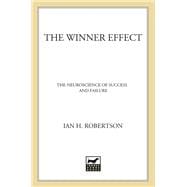
“Ian Robertson is a rare combination: a cutting edge neuroscientist whose important research is done in great depth and with careful detail, who also has the ability to step back, take risks, and explore the big picture, with a vivid, clear, engaging style, and enviable energy.” —Norman Doidge, author of the New York Times bestseller The Brain that Changes Itself
A neuroscientist and trained clinical psychologist, Ian Robertson is an international expert on neuropsychology. Currently Professor of Psychology at Trinity College Dublin, and formerly Fellow of Hughes Hall, University of Cambridge, he holds visiting professorships at University College London and Bangor University in the United Kingdom, and is a visiting scientist at the Rotman Research Institute in Toronto, Canada. He is a member of the Royal Irish Academy and has published over 250 scientific articles in leading journals. He is also author and editor of ten scientific books, including the leading international textbook on cognitive rehabilitation, and three books for the general reader including Mind Sculpture: Your Brain’s Untapped Potential. He is a regular keynote speaker at conferences on brain function throughout the world. He lives in Dublin, Ireland.
Learn more at www.TheWinnerEffect.com.
"Fascinating."
—The Sunday Times (UK)
"Compelling stories combine with cutting-edge science to show why coming first is not the same as being a real winner -- engrossing."
—Oliver James, author of They F*** You Up
“Like a masterful detective, Dr. Robertson provides a captivating and insightful journey into understanding the mystery of the effects of power on human behavior and thinking.”
—Mike Hawkins, award-winning author of Activating Your Ambition: A Guide to Coaching the Best Out of Yourself and Others
“He tells a compelling, vivid and instructive story of how we are empowered and how we are disempowered and how we succeed and how we fail. I really enjoyed it -- it is a must read.”
—Raymond Tallis, author of Aping Mankind
“A fascinating topic dealt with in a fascinating way. … I love the book.”
—Matt Cooper, author of How Ireland Really Went Bust
“What does it take to be a winner; to be successful and achieve at an optimal level? Professor Robertson has masterfully synthesized cutting edge social, cognitive, and developmental psychology, as well as neuroscience with fascinating stories of notable people in the public eye to answer this question. Thoroughly researched and engagingly written by an international scholar, once you begin reading this book it will be difficult to put down. Whatever your profession, this remarkable book will most assuredly resonate with you.”
—John B. Arden, PhD, author of Rewire Your Brain
"Utterly fascinating."
—Publishers Weekly
The New copy of this book will include any supplemental materials advertised. Please check the title of the book to determine if it should include any access cards, study guides, lab manuals, CDs, etc.
The Used, Rental and eBook copies of this book are not guaranteed to include any supplemental materials. Typically, only the book itself is included. This is true even if the title states it includes any access cards, study guides, lab manuals, CDs, etc.